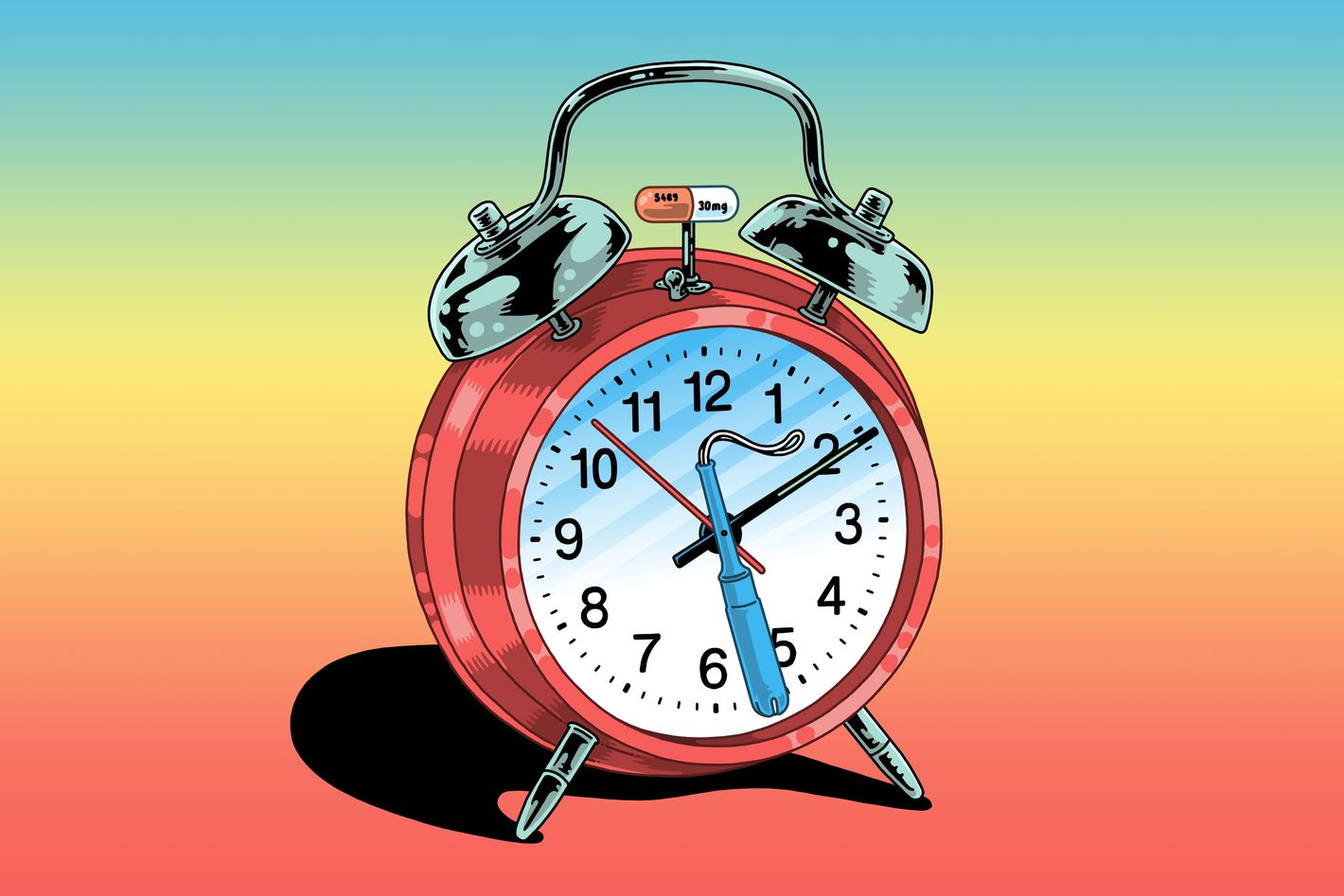
On an otherwise forgettable Tuesday in early December, I opened the washing machine and was hit with the overwhelming smell of fish. I pulled out a pair of pajama pants, and the pocket was greasy with two ruptured softgels of cod-liver oil I’d forgotten to remove. The whole load reeked like a cast-iron skillet of seared salmon. I was furious I could be so stupid and careless.
I’d taken my lisdexamfetamine dimesylate, the generic version of Vyvanse, that morning, just as I had almost every day since I was diagnosed with ADHD a month earlier at age 35. The first time I swallowed the yellow capsule, I proceeded to paint my home office in two coats of White Dove, the result of a euphoric burst of energy that felt entirely new to me. The morning of the fish-pill incident, though, I felt so tired that I took a nap. I did not feel at all like I’d ingested a stimulant.
I blamed myself for my low energy and lack of focus. Maybe I hadn’t slept well or eaten enough protein — or something? But a month later, I was again overwhelmed with fatigue, paralyzed by small tasks, and hating myself. And again the month after that. I realized my meds seemed to stop working right before my period began.
Hormonal fluctuations in ADHD symptoms aren’t rare (on Reddit, a cadre of women commiserate over taking high doses of stimulant drugs that seem to work no better than sugar pills), but the scientific community has been slow to recognize them. One study found ADHD diagnoses in women ages 23 to 49 nearly doubled between 2020 and 2022, and another found a 14 percent increase in stimulant prescriptions for women and girls 5 to 64 between 2020 and 2021. That uptick has likely prompted more complaints about period-related dips in drug efficacy.
Although just a handful of researchers are investigating the trend, a theory surrounding it has emerged: When estrogen is high, dopamine (the mood-regulating brain chemical that ADHD meds like Ritalin and Concerta boost) is also high, says Dr. Ellen Littman, a psychologist who has worked with high-IQ women and girls with ADHD for more than 35 years. People with ADHD have dysregulated dopamine functioning, so when their estrogen level drops (typically, right before the menstrual bleed begins), they feel the loss of its compensatory effect on their dopamine levels.
“This is what we clinically see,” says Sandra Kooij, a psychiatrist working in the Netherlands and the founder and chair of the European Network Adult ADHD. She says doctors can’t measure dopamine, but they can measure estrogen.
Formal research on women’s hormones and ADHD is scarce. The current theory largely builds on a 2017 study that followed 32 women with regular periods and found ADHD symptoms worsened when their estrogen levels were low. But the vast majority of ADHD research is male-centric.
This has led to a care crisis for women. Within the medical community, there’s no consensus about who should treat a female ADHD patient with symptoms that present differently depending on where she is in her cycle. These women tell me they often bounce among gynecologists, psychiatrists, and psychologists and are sometimes given additional diagnoses, like anxiety, depression, and premenstrual dysphoric disorder. In 2021, Kooij and her collaborators published a study suggesting that women with ADHD experienced more frequent and severe hormone-related mood disorders compared with the general population. “I had to consider, Why is this happening?” she says.
Carmen, a 38-year-old mother of three in Michigan, realized her period seemed to be rendering her 40-mg. of Vyvanse ineffective after she saw a TikTok that described her symptoms. She had previously attributed her lack of concentration, short fuse, and exhaustion to her multiple sclerosis and PMS. Carmen’s primary-care doctor has suggested she take a stimulant booster dose on the days she needs it but also cautioned that there’s not much research to back that approach.
When I FaceTimed Carmen, she struggled to focus on the conversation while juggling requests from one of her kids. Every month, she tells me, she turns into “an idiot,” becoming extra forgetful and hot-tempered. “Three kids asking me different things at the same time,” she says. “I can handle it on other days that I feel more clear.”
In a 2023 study building on her earlier work, Kooij and colleagues found that increasing the dosage of ADHD meds the week before menstruation improved inattention, irritability, and energy levels for all nine of their research participants. It was a small sample size, but it furthered Kooij’s hypothesis that clinicians could improve women’s symptoms if they treated both their hormonal and their neurological systems.
“It’s important for the treating physician to look at the individual’s needs,” says Dr. Patricia Quinn, a retired developmental pediatrician who co-founded the National Center for Girls and Women with ADHD. Some struggle with focus and energy for two weeks before their period, while others notice the problem only for a few days, and still others struggle the entire time they are bleeding. In her practice, she adjusted her patients’ stimulant doses and regulated their hormones with birth control.
The lack of education about the relationship between ADHD and hormones can lead women to dark places if they remain unaware. Instead of recognizing that their worsening ADHD symptoms may connect to cyclical hormonal changes, women might blame themselves. Jes Fleming, a holistic PMDD specialist, says many of her clients are riddled with shame and guilt, which transform into “negative self-talk, low self-esteem, self-harming behaviors, and suicidal ideation.”
Aniska, who lives in Atlanta, was diagnosed with ADHD last year at age 32. Months later, she realized her period was affecting her meds. When I call her, she is in the middle of a premenstrual stretch and doesn’t feel like her Adderall is working. She’s also preparing for a trip to her native St. Thomas. “I’m really trying to regulate my mind and body, but my medication isn’t helping the way I need it to right now,” she says. “It sucks because I travel Monday and have so much to do before then.” She also says she’s very sensitive right now, taking everything personally. People aren’t responding to her messages. She just had her room tidied by a professional cleaner, and now, a week later, it’s a disaster again. Aniska says she’s not really upset about the mess. She’s upset with herself for being unable to maintain order.
Self-criticism is common in women with ADHD, and it can escalate into crippling fear and chronic worry. Anyone can launder fish-oil pills, but I constantly make errors — forget I’m doing laundry, create DOOM piles (“didn’t organize, only moved”), abandon side hustles. Those missteps erode my confidence and mutate into intrusive, depressive thinking that stop me from being functional. One of my biggest problems is a fear of my husband dying. Once a month, this passing thought overwhelms me and I play out his death in detail, imagining the make of the car that will hit him, whom I’ll call first. It’s anxiety, sure. But here’s the thing: When my meds work, I don’t ponder his demise. I just think about what’s for dinner.
To add to the chaos, there’s still a stimulant shortage, so every month I have to ask my doctor to resend my prescription to multiple pharmacies until we find one that has a 30-day supply of 20-mg. pills. Given this ongoing challenge, I haven’t broached adjusting the dose to match my hormonal dips — or explored whether my health insurance would cover this kind of variation. Plus when I told my doctor that my meds felt less effective around my period, she was a little curious but didn’t have much to say. Hormones, she told me, don’t factor into how she manages treatment.
















